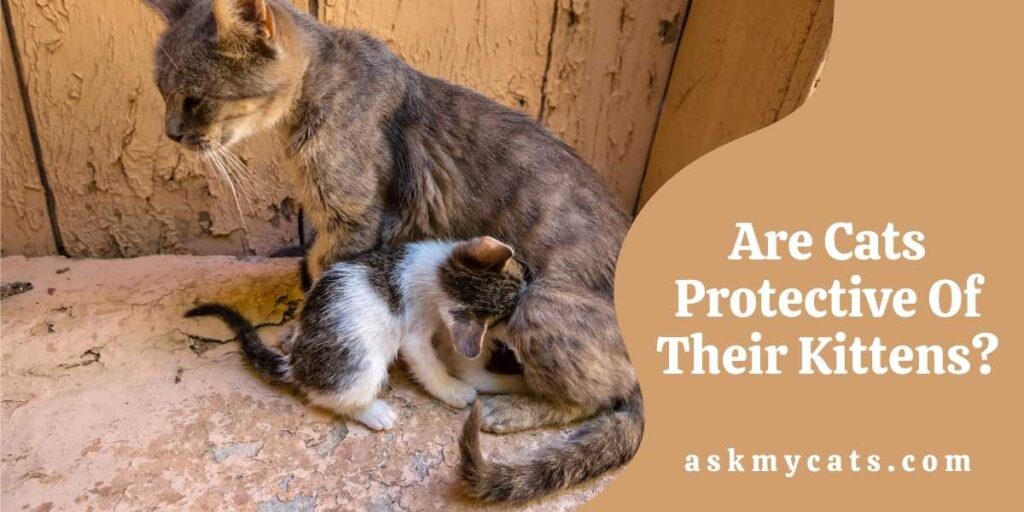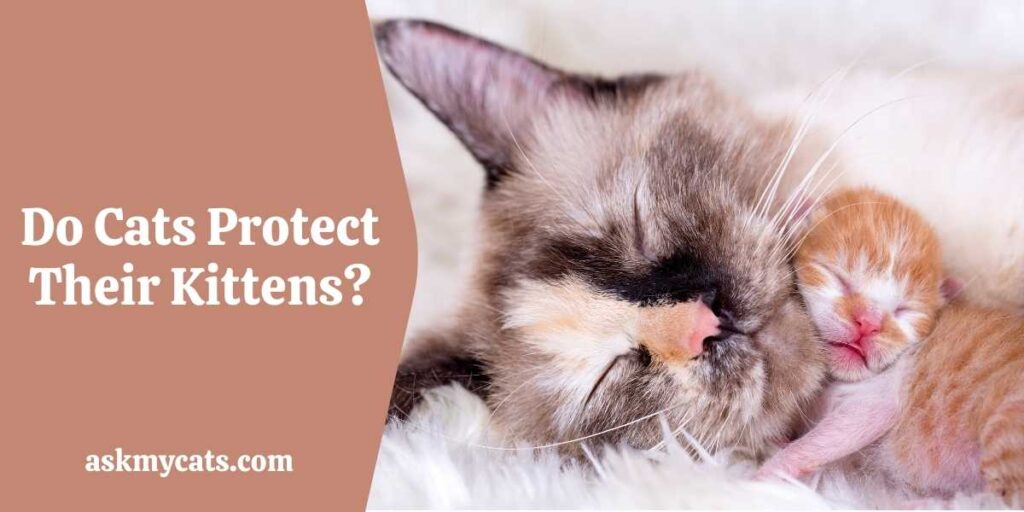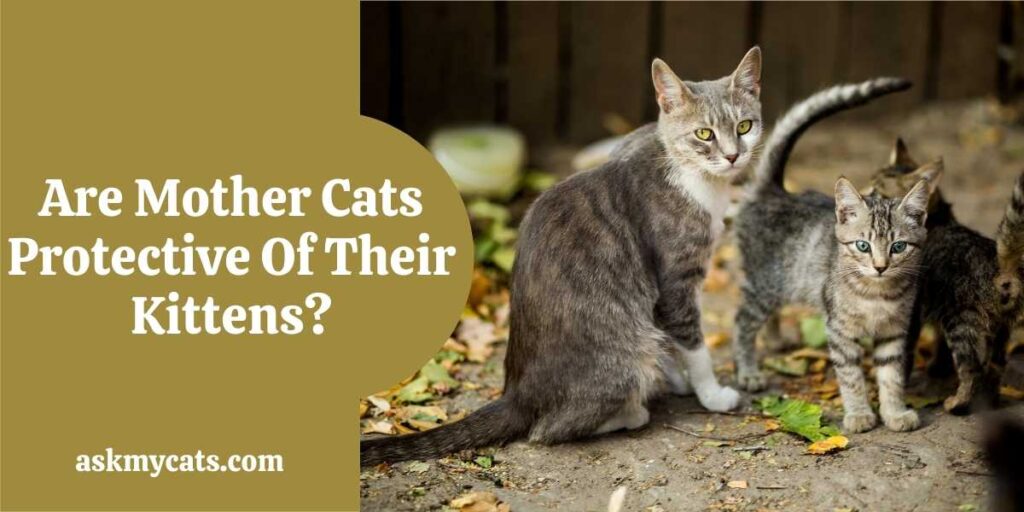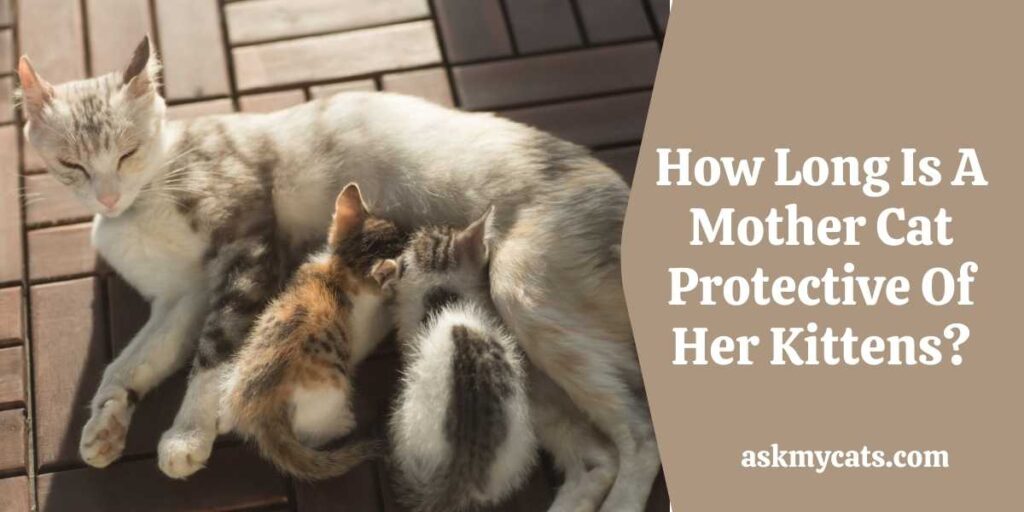Maternal hormones are present in the queen cat’s body after she has delivered her kittens. These can have a significant influence on how the cat behaves and reacts. The mother cat is fiercely protective of her kittens and may have hair-trigger temper tantrums.
Mother cats are protective of their kittens and the territory in which they live. Interlopers are perceived as dangers to the kittens by the mother, who needs to establish a secure zone for her family.
When cats come into touch with something or someone unusual, they immediately respond with what some term a “stranger danger” alarm. Any new cat entering a resident’s territory will be protective at first, but introductions can help ease the adjustment.


Give Your Cat the Perfect Day
Get the Free Ebook!
Do Cats Protect Their Kittens?
Yes, cats will protect their kittens. In the first three to four weeks after the kittens are born, queens are ruled by feline protective aggressiveness. This is the most sensitive time for new kittens (her hormones are the strongest).

The cat perceives anything unusual as possibly hazardous and a threat to the young. Even if the cats had previously been friends, the queen cat would probably be protective of her kittens and try to keep the other cats away.
While most feline aggressiveness is directed at other felines, it may sometimes be directed at people. Avoid handling the new litter for the first several days after they are born.
Some of the hostility may disappear as the kittens get older and more self-sufficient, but you can help by minimizing stress for all cats.
If you have other cats in the house, make sure the queen cat has her food, drink, and litterbox. This helps the mom stay near her kittens while avoiding stressful interactions with other cats. Aggression will be reduced if any fear about sharing is reduced.
When a queen (female cat) becomes particularly violent, this is known as maternal aggression. Her hostility is focused on humans, other animals, and other cats that come between a queen and her new litter of kittens to defend them.
Male cats have been known to cannibalize kittens. Thus the queen’s protective instinct makes sense. Her actions make sense because it’s her instinct to keep her kittens safe. Aggression in kittens usually decreases as they get older.
Are Mother Cats Protective Of Their Kittens?
Mother cats are highly protective of their kittens. Assist the queen cat by setting up your home so that the kittens are safe. A baby gate can help create a safe and contained space for the mother cat and her kittens.

Although the mother cat will most likely be able to jump over a low barrier, she will be relieved if she thinks the pups will not be able to escape.
If other cats are in the house, they should be kept out of the kittens’ area. As the kittens grow older, take the mother cat out of her limited space for some playing, and have someone else play with the kittens.
As the kittens get older, the mother will participate in some biological activity that will aid in their development. Some mother cats will move their kittens daily, while others will only move them if they are scared.
The mother’s normal instinct is to hide her offspring from predators. The mother cat will begin meowing to her kittens for them to recognize her voice and return to her.
All of these behaviors are natural, and you should let the mother cat participate in them. If she is interrupted, she may get violent (again, because she will see it as a threat to her kittens).
Ensure a kitten isn’t stranded in a new area and can’t go back to its mother if the mother cat is meowing very loudly or anxious.
Don’t be too concerned if the queen cat hostility appears to be rather powerful when the kittens are delivered. Allow the mother cat a few weeks to acclimate to her new position before assessing her aggressiveness levels after the kittens are a month old.
After the kittens have been weaned, spay your female cat to avoid future litters (and the maternal aggression that comes with new kittens).
How Long Is A Mother Cat Protective Of Her Kittens?
A mother cat protects her kittens for about 8-10 weeks. Mother cats (also known as queens) look for friendly, peaceful places to give birth to their kittens.

If your female cat is expecting, provide her with a towel-lined box in a quiet, dark room to assist her in building this region.
Mom licks the kittens as soon as they are born to remove the amniotic sacs from their faces and bodies. She’ll also gnaw through the umbilical cords and devour the placentas for a few seconds. This is entirely typical behavior.
When it comes to giving birth, cats prefer seclusion. Your cat is aware of the situation. However, you must understand how you may assist if a mom cannot care for her children.
You can gently rupture the amniotic sac with a cloth if she forgets to remove it from any kittens. Make sure there is one placenta for each kitten by counting them.
If you don’t see all of the placentas, one of them may have been retained, in which case your cat may require medical attention. She may, however, have already consumed one of them. Twin cats may share one placenta.
When kittens are born, they have poor vision and hearing. To nurse, they must rely on their instincts to locate their mother’s teats.
They can smell the milk, which is fortunate. When they sense a nipple tickling their fur, they have a response that stimulates them to suckle.
Mama cat will typically pull the infant nearer her if one of her kittens has problems reaching the nipple. Newborns usually breastfeed during the first hour or two of their lives, and they must eat within the first 24 hours of their lives.
If there are more kittens than teats, you may need to switch some of them so that everyone has a chance.
You might be interested to read about why do mother cats attack their kittens
Do Male Cats Protect Their Kittens?
Male cats do, in fact, guard kittens. According to cat specialists, this has been observed in both wild and domestic cat colonies.
While the mom cat is seeking food, feral tomcats may keep an eye on the kittens. On the other hand, some male cats are known to ignore kittens entirely.
It is a common misconception that male cats do not actively participate in the care of their kittens. Female cats are relegated to this job since they are the ones that nurture the litter from the womb until the kittens are weaned.
However, many cat owners claim that their male cats have paternal inclinations toward kittens, whether or not they are their progeny.
Male cats have been known to look after kittens in various situations. This is frequently witnessed in the home. Male cats are frequently neutered in such situations to make them less hostile toward kittens.
Compared to an undomesticated or feral situation, domesticated male cats are more responsive to and comfortable around kittens because they have adequate resources and are not under pressure to outbreed other males. They groom the kittens, play with them, and assist the mom cat in keeping an eye on them.
It has also been discovered that dominant male cats in wild cat colonies are more likely to look after kittens. They groom each other, share their food, and break up kitten fights by gently separating them with one paw.
While there have been numerous reports of male cats being nurtured, male cats are equally common to ignore and neglect kittens.
According to Dr. Katherine Houpt, a veterinary veterinarian at Cornell University’s College of Veterinary Medicine, some male cats, especially those with access to the outdoors, will generally leave the mom cat and the kittens and ignore them. In some cases, a father cat would attack the mother cat because she smells different after birth.
Frequently Asked Questions
Will my cat let me touch her kittens?
If you’ve owned your cat for a long time, she usually won’t object if you play with her kittens. If your cat is a stray or one you’ve just had for a short time, she may not appreciate it if you approach her pups. Before touching them, do it carefully and make sure she’s comfortable with it.
Will cats abandon their kittens if you touch them?
A mother cat will not “reject” kittens who have come into contact with people. You may try strewing flour about the nest and then leaving it alone for a time.
Do mother cats look for their kittens?
Feline mothers may be unhappy or perplexed initially. They may search the home for the kittens or meow, expecting them to reply. At first, this behavior may appear melancholy, but it will only last a few days until she returns to her usual schedule.
Final Words
A mother cat guards her kittens with her life. You and your family can even have a dispute with your mom’s cat. When dogs are around, this protective response is also visible. To defend her babies, a mother cat will fight dogs. Natural maternal impulses exist, and maternal aggressiveness is intense.
Ask your questions in the comments section below.
